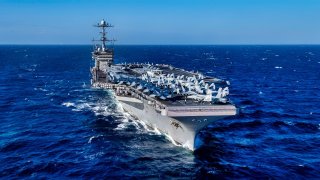America Has Aircraft Carriers, A-10 Warthogs, F-22 and More Ready for Any Iran Problem
The United States is increasing its military presence in the Middle East as Israel prepares to respond to Iran's recent missile attack. Additional U.S. Air Force F-15E Strike Eagles from the 389th Fighter Squadron have arrived in the region, joining A-10 Thunderbolt II and F-22 Raptor aircraft already deployed earlier this year.
What You Need to Know: The United States is increasing its military presence in the Middle East as Israel prepares to respond to Iran's recent missile attack. Additional U.S. Air Force F-15E Strike Eagles from the 389th Fighter Squadron have arrived in the region, joining A-10 Thunderbolt II and F-22 Raptor aircraft already deployed earlier this year.

-The U.S. Navy is also enhancing its presence, with the USS Abraham Lincoln (CVN-72) already in the area since August and the USS Harry S. Truman (CVN-75) en route to the Mediterranean Sea. This buildup follows the extension of the USS Gerald R. Ford's (CVN-78) deployment after the October 7, 2023, terrorist attack carried out by Hamas in Southern Israel.
-Additionally, the USS Wasp (LHD-1) and the 24th Marine Expeditionary Unit remain in the Eastern Mediterranean to assist with potential evacuations from Lebanon if necessary.
U.S. Bolsters Military Presence in Middle East Amid Rising Tensions
The United States is increasing its military presence in the Middle East, as Israel likely prepares to respond to Iran's missile attack earlier this month. As part of the U.S. military buildup, additional fighters have been sent to the region.
"U.S. Air Force F-15E Strike Eagles from the 389th Fighter Squadron, Mountain Home Air Force Base, Idaho, arrive in the U.S. Central Command area of responsibility," CENTCOM announced on Wednesday in a post on X, the social media platform formerly known as Twitter.

It is the latest deployment of the F-15Es to the region in the past year, and according to a report from Air & Space Forces magazine, the "first batch" of Strike Eagles was spotted last weekend at RAF Lakenheath, UK. The multirole fighters have made the long haul from Idaho with the aid of U.S. Air Force aerial fueling tankers.
The F-15Es will join the U.S. Air Force's recently arrived A-10 Thunderbolt II close air support aircraft and F-22 Raptor air superiority fighters that were deployed to the region earlier this year. The Air Force has extended the deployment of the fifth-generation stealth fighters but is rotating out F-15E, F-16, and other A-10s that were also sent to the Middle East in the spring and summer.
The Strike Eagles already on the ground are from the 335th Fighter Squadron, Seymour Johnson Air Force Base (AFB), North Carolina. The aircraft arrived in April and joined with the F-16 Fighting Falcons and other coalition warplanes in aiding the defense of Israel, which came under a drone and missile strike on April 13. The 335th FS will remain in the region.
Sea Power is Also Present
In addition to the aircraft that will remain stationed at bases throughout the region, the U.S. Navy Nimitz-class nuclear-powered supercarrier USS Abraham Lincoln (CVN-72) arrived in the region in August, while her sister carrier USS Harry S. Truman (CVN-75) is heading to the Middle East and is expected to arrive in the Mediterranean Sea later this month.
The U.S. Navy has been rotating carriers to ensure a near-constant presence, including having two carriers in the region at a time. USS Gerald R. Ford (CVN-78) saw her deployment extended last fall following the October 7, 2023, terrorist attack carried out by Hamas in Southern Israel. USS Dwight D. Eisenhower (CVN-69) joined the CVN-78 and remained in the region until returning to the Naval Station Norfolk in July. USS Theodore Roosevelt (CVN-71) was also deployed to the Red Sea in July until the arrival of CVN-72.
In addition, the amphibious assault ship USS Wasp (LHD-1) along with the 24th Marine Expeditionary Unit (MEU), remains in the Eastern Mediterranean to help evacuate U.S. citizens from Lebanon should the need arise.
Author Experience and Expertise: Peter Suciu
Peter Suciu is a Michigan-based writer. He has contributed to more than four dozen magazines, newspapers, and websites with over 3,200 published pieces over a twenty-year career in journalism. He regularly writes about military hardware, firearms history, cybersecurity, politics, and international affairs. Peter is also a Contributing Writer for Forbes and Clearance Jobs. You can follow him on Twitter: @PeterSuciu. You can email the author: [email protected].
Image Credit: Creative Commons and/or Shutterstock.


